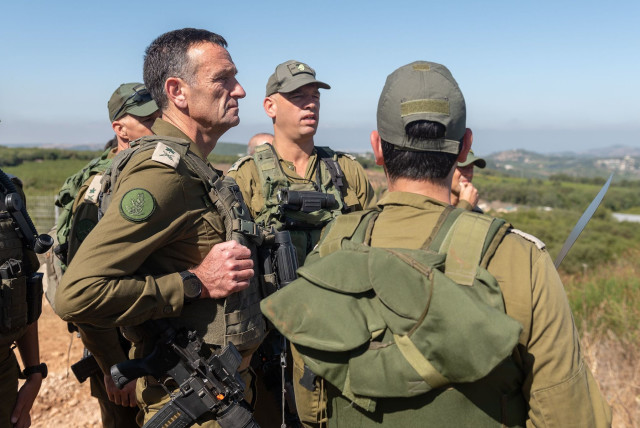Has judicial reform harmed IDF’s operational preparedness? - analysis

Thousands of IDF reservists have stopped showing up for duty, leading the army and government to worry about IDF readiness.
With thousands of IDF reservists stating that they will not show up for reserve duty to protest the judicial overhaul plan, the extent to which this has impacted IDF readiness and competence has become one of August’s hot topics.
Has this already harmed the IDF’s operational preparedness? Is it harming the Israel Air Force’s ability to carry out operations far from Israel’s borders?
Prime Minister Benjamin Netanyahu bristled last week when air force chief Tomer Bar said that, while the damage to the IDF’s competence has been slight, it is getting “worse and worse with time.”
Netanyahu met with the security chiefs to discuss the issue, as he did with the Knesset’s Foreign Affairs and Defense committee.
National Security Council head Tzachi Hanegbi, in a KAN Bet interview on Sunday, said that he does not think at this moment that the IDF’s readiness has suffered, because of two main reasons. First, he said it takes time for this type of harm to filter down through the entire military system. Secondly, he pointed out that many of the same reservists who have said they will not show up for their regular-scheduled reserve duty, also made clear that if Israel were attacked by its enemies, they would be the first to respond.

But he added that, if this trend continues for another year or two, “there can be an accumulative erosion” that could impact the IDF’s readiness if there were a multi-front war.
In other words, the immediate concern doesn’t solely focus on the short-term combat fitness of reservists or pilots – this can be restored. Rather, the broader apprehension lies in the long-term impact of the refusal of reservists to serve on the entire military structure.
The bigger concern is regarding the long-term impact
According to Udi Lebel, a researcher specializing in civil-military relations at Bar-Ilan University’s School of Communication and at the BESA Center for Strategic Studies, the concern is less about the military’s operational competence tomorrow, next week or next month, but about how this will affect those who will go into the army in two and three years from now.
Lebel explained that protests against government policy historically led various demographic groups to increase their willingness and motivation to join the army, believing that this is where Israeli society can best be influenced. However, the current protests are granting legitimacy to the idea of abstaining from service to influence policy, albeit for now only from reserve duty. He said this is something not seen before.
To illustrate his point, Lebel pointed to the aftermath of the 2005 withdrawal from Gaza. Following the initial shock of the withdrawal, where a few voices within the national religious camp opposed serving in an army engaged in uprooting settlements, this was followed by a massive campaign by leaders of this camp encouraging their youth to serve in large numbers to exert influence over policy.
Leaders of the religious Zionist camp rallied their youth to join combat units, potentially positioning them in key roles in the army where they might be able to argue forcefully and effectively against further territorial concessions in the future. This spurred those on the other side of the political spectrum – the Left and the kibbutzim – to encourage their youth to enlist in large numbers as well, so that the Right could not prevent another disengagement.
Lebel noted that this period coincided with then-prime minister Ehud Olmert’s discussions about implementing a plan similar to the Gaza disengagement in parts of the West Bank. Consequently, various secular military preparatory programs (mechinot) arose to counterbalance the surging enlistment from the national religious camp.
“The ethos then was how do I articulate my protest?” Lebel said. “By going into the army and using it as a platform where I am able to promote an agenda, and by being there I can have influence – because there is no better way to promote an agenda than by doing it inside the army.”
Today, however, a complete reversal is unfolding. The leaders of the anti-judicial reform movement are not advocating for army enlistment as a means to influence government policy; instead, they are urging reservists to refrain from joining the army, and this could have a spill-over effect on regular conscripts, something that could potentially affect the overall readiness of the IDF.
Furthermore, not only are those in the anti-judicial reform camp the ones questioning army service. Paradoxically, Lebel said, attacks by some politicians and government officials on the IDF top brass and on reserve pilots refusing to serve are creating a perception that the IDF – particularly critical segments like the air force – is in the grips of the Left and the country’s “elites.”
This discourse has brought about a degrading of the value and attractiveness of the army for some on the Right, he said, which could significantly impact the willingness of some in the national religious camp to serve.
Adding to this, the nearly non-existent enlistment of haredim and within elements in the ultra-conservative national religious Hardal camp due to the reinvigorated bill, that would give blanket IDF conscription to yeshiva students, alongside decreased motivation among Arabs and Druze due to the 2018 Nation-State Law and the far-right character of the government, the IDF faces a potential readiness challenge. This will likely become evident in conscription callups in two to three years.
While those currently entering service may be less affected by the current controversy, as they have already made their choices, the ongoing toxic atmosphere may influence those currently in 11th grade and very much exposed to what is happening.
And that, Lebel said, is what discussions about the IDF’s preparedness are referring to. The concern is less about the operational competence of a squadron that might be sent on a mission over Syria in another couple of weeks. Instead, it is centered on whether the IDF will continue to be an enticing institution, still able to attract sufficient applicants for the top positions in two and three years’ time.
